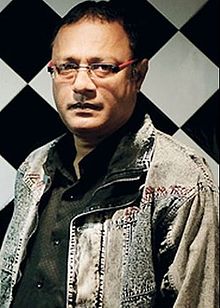Indian film director (1949–2014)
Anjan Das |
|---|
 |
| Born | (1949-11-17)17 November 1949
|
|---|
| Died | 2 June 2014(2014-06-02) (aged 64)
|
|---|
| Nationality | Indian |
|---|
| Occupation | Film director |
|---|
Anjan Das (17 November 1949 – 2 June 2014) was a distinguished Indian film director renowned for his contribution to cinema, often hailed for creating "Poetry on Celluloid," a descriptor bestowed by critics following his lyrical masterpiece, Saanjhbatir Roopkathara (Strokes & Silhouettes, 2002). He was honored with the National Film Award for Best Film on Family Welfare for Faltu (The Saga of Ranirghat, 2006), adding to his impressive array of accolades, including multiple Bengal Film Journalists' Association Awards and global recognition at esteemed film festivals.
Career
An illustrious career marked by two national awards and international acclaim, Das embarked on his filmmaking journey in the mid-1970s, debuting with documentaries such as "The Art of Anant Malakar" and "Tripura." His inaugural feature, Sainik (Soldier), premiered at various international film festivals, including Berlinale in 1976, further expanding its reach to Mannheim, Tehran, Kraków, Mongolia, Yugoslavia, and the San Remo Film Competition in Italy.
In 2001, Das crafted the groundbreaking Saanjhbatir Roopkathara, the first regional film ever picked up by Hollywood giant Columbia Tristar (now Sony Pictures) for distribution. The film received international acclaim, gracing festivals like the Montreal World Film Festival, BFI London Film Festival, and International Film Festival Rotterdam, among others. Notably, it was selected as one of the seven best films at the BFI London Film Festival.
In 2006, he made the film Faltu (The Saga of Ranirghat, 2006), which also did its usual round of festivals and fetched him the National Film Award for Best Feature Film on Family Welfare. In 2007, he made Jara Bristite Bhijechhilo (Drenched... in the rain), for which he won the Special Director's Award at Almaty, Kazakhstan, and two awards in Madrid, Spain: Best Actress and Special Jury Award for the Director. This film also was an entry in the Indian Panorama of International Film Festival of India 2007.
He won 11 Bengal Film Journalists' Association Awards for the last three films. He made a documentary on the rebel poet Kazi Nazrul Islam, produced by the Ministry of External Affairs, Government of India and was inaugurated by the then External Affairs minister, Pranab Mukherjee at a function at Habitat Centre, New Delhi.
Thereafter, he also made a few documentaries produced by PSBT and Films Division, which include Maa Durga (on goddess Durga) and Flow & Ebb (on the boatmen of Bengal). His feature film Swarger Nichey Manush (People under Heaven) starring Rituparna Sengupta was showcased at various film festivals like Mumbai Film Festival, Osian's Cinefan Festival of Asian and Arab Cinema, etc. but is still awaiting commercial release. Incidentally, all the above films were shown at Osian's Cinefan Festival of Asian and Arab Cinema, perhaps the largest showcase of films in India.
His very popular film Achin Pakhi (A Love Story) had its International Premiere at Cairo International film Festival 2010 and World Premiere under Indian Panorama at International Film Festival of India 2010. His next film Banshiwala (The Flautist), based on Shirshendu Mukhopadhyay's novel of the same name, was highly acclaimed by the critics and won 2 international awards - Golden Kahuna Award at Honolulu Film Awards 2011 and Bronze Palm Award at Mexico International Film Festival 2011. It was also showcased at New Jersey International Film Festival. His next Bedeni (The Snake-Charmer's Wife) was based on Tarashankar Bandopadhyay's novel and starred Rituparna Sengupta in a challenging role for which she earned widespread acclaim.
His last film Ajana Batas (The Mystic Wind) starring Paoli Dam and based on Joy Goswami's novel, had its World Premiere at International Film Festival of India 2013 (Indian Panorama). It also won him the Bronze Palm Award at Mexico International Film Festival 2014. It was officially selected (in competition) at Washington DC South Asian Film Festival 2014, Indian International Film Festival of Queensland 2014, and FerFilm Festival 2015. It competed for the Conchshell Award at Belize International Film Festival 2014. The film garnered critical acclaim and was released commercially nine months after his demise.
Anjan Das' trademark was that all his films were based on literature. Three of his films are based on eminent poet Joy Goswami's novels. All his films are labelled as lyrical and poetic.
